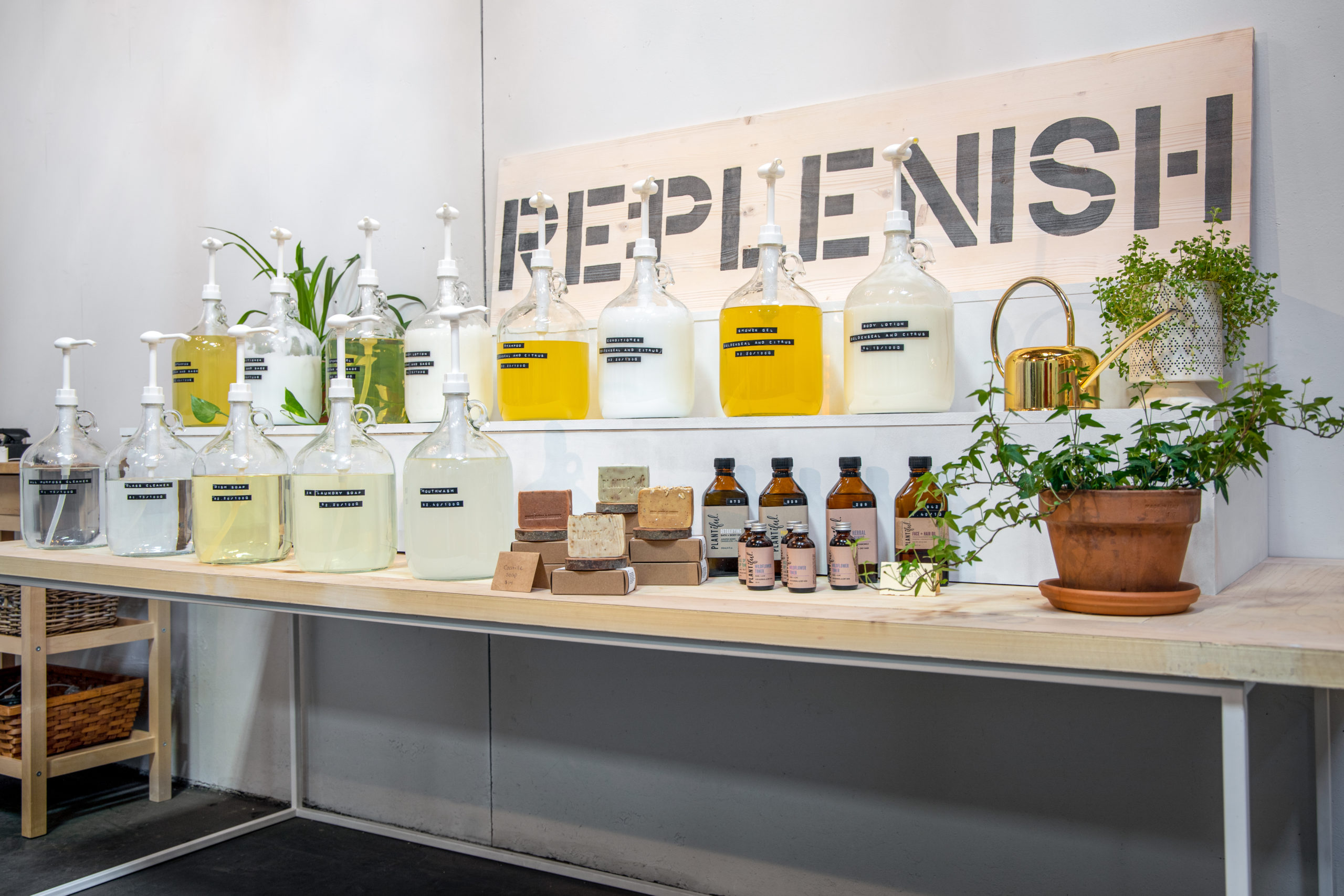Ritchie Market’s local Transcend Coffee is a bustling hub. The door opens up to the café on the right, Blind Enthusiasm on the left, and Acme Meat Market in the back. The area is completely local, totally Edmonton, so it is no wonder that the co-founders of Edmonton’s first zero-waste store asked to meet there.
On Jan. 4, Re:Plenish opened its doors in the growing eco-friendly movement. Currently working in a pop-up format, the weekend-only store is located in Forge 53’s incubation space. Forge 53 is a local furniture maker; the incubation space has a low overhead, which means the zero-waste company could exist with a minimal initial investment. The small space is a great start-up for the two owners until they find something a little more concrete. A minimalist’s store, Re:Plenish boasts of biodegradable and reusable products, locally made and sourced. For Karine St-Onge and Meghann Law, it is important for their products to be Edmonton-made first, and Canadian second.

“The idea is that you’re not buying anything that you would ever have to throw away. If you are, then at the very least it’s biodegradable,” says co-founder Law. The MacEwan University alumna graduated with a diploma in speech-language pathology.
She met her future business partner St-Onge while studying psychology at the University of Alberta. The one-time roommates began a friendship that has now spanned close to a decade. St-Onge graduated from the University of Alberta with a major in history and completed her Masters in Library Information Science in Ontario.

The two were inspired to become zero-waste after watching environmental activist Lauren Singer’s video on her mason jar full of trash. In the now-viral video, Singer explains how she committed so thoroughly to a zero-waste lifestyle that four years’ worth of trash fit inside a single mason jar.
But the two 28-year-olds feel that being zero-waste can be an intimidating premise.
“That’s kind of an issue,” says St-Onge. “That’s something we were very aware of, and wanted to make sure that Re:Plenish was accessible, easy to deal with.”
St-Onge adds that they wanted the store layout to be easily understood so that new customers “felt safe that you could come in and talk to us and say, ‘I don’t know what to do here,’ and then we can walk you through it.”
The two spend the majority of their time researching companies that have the same mission statement as them. The companies they stock have to check all the boxes: they have to be sustained, sustainable, sustainably sourced, biodegradable, vegan, and cruelty-free. Re:Plenish looks at how companies obtain raw materials and give preference to Canadian ingredients.

Law stated in an email, “Sticking to Canadian ingredients means that we know there are oversights and regulations to make sure that both land and bodies of water are respected during production, it also means that we can reach out to companies directly to discuss how their products are made. Canadian products also mean less shipping and carbon outputs.”
Amongst the 20-somethings who are trying to be greener, Re:Plenish has also seen older clientele.
“They’re like 70,” says Law, “They are coming in and saying ‘I want to make the change.’
“Which is so refreshing because they probably actually already lived through a time where consumerism inherently was zero-waste because there was more refilling back in the day when plastic wasn’t as abundantly available. So they’ve kind of lived through the boom of the disposable society and then come right back to be like kids — woah — pump the brakes. That was a bad idea,” she adds.
The two friends came up with the idea of a zero-waste store in November 2019 and had it incorporated and running by January 2020. However, their business model focuses on slow growth. So, while they admit that there is money in the business, they want to be as ethical and environmentally friendly as possible.
But a large part of their business is focused on the circular economy, an alternative to the traditional linear economy.
“This absolutely needs to happen.
If it doesn’t, we’re all going to get sick and the planet is going to die.”
— Meghann Law, Re:Plenish co-founder
Where the latter follows the buy-use-dispose (or recycle) rule, the circular economy is based on reducing waste and the environmental impacts of consumerism, i.e., buy-use-and use again. Most companies rely on the traditional linear method and refuse to change, like Coca-Cola. The global giant told BBC earlier this year that they will not ditch single-use plastic bottles. As Daniel Thomas writes in his BBC article, “The drinks giant produces about three million tonnes of plastic packaging a year — equivalent to 200,000 bottles a minute.”
On the other hand, Colgate partnered up with TerraCycle to create a free recycling program.
“I know pressure does work,” St-Onge says.
“So in terms of business, I understand why they’re doing what they’re doing,” Law says about Coca-Cola, adding, “but it’s not an ethical business. And I guess it would be our hope that people would kind of just stop buying that product.”
Sometimes, the hefty price tag on eco-friendly products is enough to drive anyone away, but both founders believe that accessibility is key.
If there are just as many refilleries and zero-waste stores like supermarkets, the prices and cost of production would automatically decrease.
Vancouver and the Canadian east coast have embraced the movement by opening up multiple refilleries and zero-waste stores. On the other hand, Edmonton is further behind in this movement than it should be — with only Earth’s General Store as a refill store and now Re:Plenish.

That said, Law says that these changes will always start in the centre of the city before spreading out and influencing rural areas. She continues to say that consumerism was different in the ‘90s.
“You wanted things to be disposable. That’s what the media told you,” Law says. “You should want convenience. And of course, you buy into it because it’s everywhere. You know?”
But times have changed. St-Onge explains that growing up on an acreage, her family made compost, raised meat, and were relatively sustainable. They just never described themselves to be. And although she no longer lives on an acreage, she still makes her own compost and is an avid gardener.
However, the owners feel that people no longer have the right to choose how they shop, at least when it comes to essential products.

“I mean, the thing is, we know this is not a luxury at this point,” Law says. “This absolutely needs to happen. Because if it doesn’t, we’re all going to get sick and the planet is going to die.”
MacEwan alumna, library technician, and now ex-roommate of Law and St-Onge, Lucy Wright said via email that she believes it’s really not possible to ignore the effects of waste and pollution on a global scale, and the only way to do one’s part is to make more sustainable choices where and when you can. Re:Plenish, and other like-minded Edmonton retailers, are making those choices easier.
“I think that a major barrier to people who want to be zero-waste, or at least to people who want to be more thoughtful about the footprint they leave, is the availability of good, eco-conscious option,” she wrote.
“Having a space like Re:Plenish makes it easier to make more sustainable choices without having to sacrifice convenience or quality.”
By selling essential, everyday goods, St-Onge and Law are able to provide a valuable service and fill a hole in Edmonton’s retail.

Re:Plenish customer and Law’s cousin Danica Chamberland feels that Edmontonians are making small changes in their lives as a way to make a difference.
“They seem to regularly support local stores and restaurants over chains,” she states over email. “(Edmontonians) are proud of the city’s composting and recycling programs and they participate in a variety of programs to support the River Valley and keep it green.”
And so while Law and St-Onge understand how difficult it may be to be completely green or zero-waste, they implore Edmonton to start with just a few household items.
“There’s an onus on you as an individual to be critical,” Law says.





0 Comments